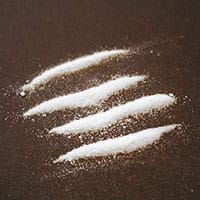Topiramate, an FDA-approved drug for the treatment of epilepsy and weight loss, may also prove effective in helping curb cocaine use in people addicted to both alcohol and cocaine. So say researchers at Penn Medicine’s department of psychiatry in a study published in Drug and Alcohol Dependence. But while prior studies by other researchers indicated that Topiramate can lessen alcohol dependence and also reduce the incidence of cocaine relapse, no clinical trial until now has explored using topiramate to treat simultaneous alcohol and cocaine addiction. Since it is well documented that alcohol and cocaine addiction are frequently diagnosed concurrently, treatment therapies that target both addictions could be the best overall strategy. Unfortunately, the results of the 13-week clinical trial of 170 alcohol and cocaine dependent people were mixed. While topiramate did reduce cravings for alcohol among study participants, it did not reduce drinking. The drug was also not better at decreasing cravings for cocaine. The good news is that addicts who received topiramate and not a placebo were more likely to remain in treatment and to abstain from cocaine use during the last three weeks of the clinical trial. Who appeared to benefit most? According to the researchers, it was people with more severe symptoms of cocaine withdrawal, including agitation, depressed mood, and restless behavior, which seemed to get the most benefit from taking topiramate. The study’s first author Kyle M. Kampman, MD, professor of psychiatry at the Perelman School of Medicine at the University of Pennsylvania and medical director at the Charles O’Brien Center for Addiction Treatment, noted that cocaine dependence in the United States (and Europe) continues to be a significant public health issue. He also said while drug counseling remains the preferred treatment, “many patients do not respond completely to it,” thus reinforcing a current research priority to develop effective treatment medications. “Based on this study’s results, this drug, plus cognitive behavioral therapy, may be a good option for people addicted to both alcohol and cocaine to help reduce their cocaine use,” said Kampman. Other study findings:
- 20 percent of users on topiramate abstained from cocaine during the last three weeks of the trial, compared to 7 percent on a placebo.
- Heavy users had significantly more negative cocaine drug tests during the trial compared to those treated with a placebo (17.6 percent versus 8.8 percent).
- Sixty-five percent of study participants given topiramate remained in the trial, while 59 percent on a placebo stayed. This is considered a statistically significant difference.
He said that future studies are planned that will combine topiramate with other promising medications for cocaine dependence treatment. The hope is that the combination of medications will help addicts achieve higher levels of cocaine abstinence than this study achieved with topiramate alone. Funding for this study was provided by the National Institute on Drug Abuse (NIDA).

